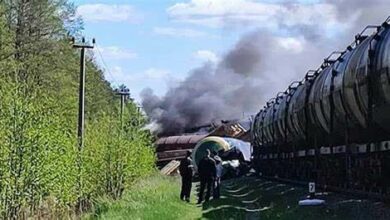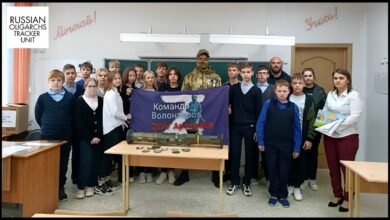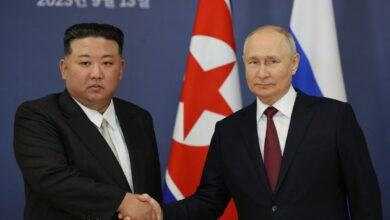Russia is now Europe Largest Economy says Putin | China India & Russia will dominate World Economy

1. Introduction
In a shocking announcement, Russian President Vladimir Putin declared that Russia is now Europe Largest Economy, surpassing traditional powerhouse Germany. This shift in economic power marks a significant turning point for both Russia and the European Union as a whole. Additionally, Putin predicts that China, India, and Russia will dominate the world economy in the coming years. This article takes a closer look at Putin’s statement and analyzes the potential implications for global trade and geopolitics.
686 Day the Russia-Ukraine War Conflict Updates
2. Europe’s shifting economic landscape
Europe’s shifting economic landscape is evident in the recent declaration by Russian President Vladimir Putin. With Russia surpassing Germany as the largest economy in Europe, the balance of power in the region is undergoing a significant transformation. This shift has far-reaching implications for the European Union and its member states.
Traditionally, Germany has been the dominant economic force in Europe, driving growth and influencing economic policies within the EU. However, Russia’s rise to the top spot signifies a new era of economic power dynamics. It not only highlights Russia’s economic resilience but also its potential to shape the future of Europe.
This changing landscape also has implications beyond Europe. As Putin predicts, the combined forces of China, India, and Russia will likely dominate the world economy. This assertion suggests a major realignment in global trade and geopolitics. It remains to be seen how these emerging powers will influence existing economic alliances and power structures.
In the next section, we will delve deeper into the factors behind Russia’s economic growth and explore the potential challenges and opportunities it presents for the European Union and the global economy. Stay tuned for more insights on this momentous development.
3. Russia’s rise to the top To become Europe Largest Economy
Russia’s rise to become the largest economy in Europe is not an overnight phenomenon but a result of several key factors. One of the primary reasons behind this growth is Russia’s vast reserves of natural resources, including oil, gas, and minerals. The country has successfully capitalized on these resources, making it a major player in the global energy market.
Additionally, Russia’s economic policies, under Putin’s leadership, have focused on diversifying the economy and reducing dependency on oil and gas exports. The government has implemented reforms to attract foreign investments, improve infrastructure, and promote innovation and technology. These efforts have helped bolster Russia’s economic growth and increase its global competitiveness.
However, despite its economic achievements, Russia still faces challenges. The country’s political climate and international relations are often marked by uncertainty and volatility, which can impact investor confidence. Furthermore, Western sanctions imposed on Russia due to its actions in Ukraine have limited its access to global markets and technology.
The European Union, in particular, must navigate this new economic landscape carefully. With Russia’s growing influence, EU member states will need to reassess their economic and political relationships, considering both the opportunities and risks associated with closer ties to Russia.
In the following section, we will analyze the potential implications of Russia’s economic rise on the European Union and explore how other global powers, including China and India, factor into this shift of the world economy. Stay tuned for more insights on this pivotal development.
4. The potential of China and India
China and India, alongside Russia, are poised to dominate the world economy in the coming years. China, as the world’s second-largest economy, has experienced remarkable growth over the past few decades. Its robust manufacturing sector, technological innovation, and vast consumer market are undeniable strengths that make it a force to be reckoned with. China’s Belt and Road Initiative, which aims to build infrastructure and increase connectivity across Asia, Africa, and Europe, further solidifies its global influence.
Similarly, India has emerged as a key player in the global economy. With its young and vibrant population, India offers immense potential for growth and consumption. The country has made significant strides in sectors such as information technology, pharmaceuticals, and services. Furthermore, India’s ambitious reforms, such as the Goods and Services Tax (GST) and the Make in India campaign, have attracted foreign investments and helped enhance its competitiveness.
As Russia solidifies its position as Europe’s largest economy, it will undoubtedly interact with China and India. Closer economic ties among these three countries could result in increased trade and investments, leading to a reshaping of the global economic order. It will be crucial for the European Union and other global powers to adapt to these shifts in order to leverage the opportunities presented by this emerging economic landscape.
Stay tuned for the next section where we will delve deeper into the potential implications of Russia’s economic rise on the European Union and explore the changing dynamics in the world economy.
5. A dominant force in the world economy
As Russia establishes itself as Europe’s largest economy, it is set to become an even more influential player on the world stage. This newfound dominance will have significant implications not only for the European Union but for the global economy as a whole.
Russia’s vast reserves of natural resources, particularly its oil and gas reserves, have long been a source of economic strength. As the world’s largest exporter of natural gas and second-largest exporter of oil, Russia holds immense power in shaping global energy markets. Additionally, its strategic location between Europe and Asia positions it as a key transit hub for goods and commodities.
Furthermore, Russia’s increasing economic clout will strengthen its ability to forge partnerships and influence international affairs. It is already actively engaging in economic cooperation with China and India, both of which are significant players in the global economy. This alignment of interests could lead to the formation of a powerful economic bloc that challenges the dominance of traditional global powers.
In the next section, we will explore the potential consequences of Russia’s economic rise on the European Union. We will analyze how the EU can adapt to these changes and explore the evolving dynamics in the international economic landscape. Stay tuned for valuable insights on this evolving global scenario.
6. The implications for global trade and investment
Russia’s emergence as Europe’s largest economy will undoubtedly have far-reaching implications for global trade and investment. As Russia solidifies its position as a dominant player in the global economy, it is poised to attract significant foreign investment and foster an environment conducive to trade partnerships.
With its vast reserves of natural resources and strategic location, Russia holds immense potential for international businesses seeking to diversify their supply chains and tap into new markets. As a major exporter of oil and gas, Russia’s influence in shaping global energy markets will only strengthen, making it an attractive partner for energy-dependent nations.
Furthermore, Russia’s economic rise, coupled with its cooperation with China and India, presents the opportunity for the formation of a powerful economic bloc that could challenge the dominance of traditional global powers. This new alignment of interests has the potential to reshape the dynamics of global trade and investment, paving the way for a more multipolar economic landscape.
In the next section, we will delve deeper into the specific implications of Russia’s economic rise for global trade and investment. We will examine the potential challenges and opportunities that arise from this shift and explore how businesses and nations can adapt to these changes to thrive in the evolving economic landscape. Stay tuned for valuable insights on navigating the complexities of this shifting global scenario.
7. Concluding thoughts on the changing dynamics
As we wrap up our exploration of Russia’s emergence as Europe’s largest economy and its implications for global trade and investment, it is clear that we are witnessing a seismic shift in the global economic landscape. The rise of Russia, combined with the cooperation between China and India, presents a realignment of power that has the potential to challenge the dominance of traditional global powers.
While this shift undoubtedly brings new opportunities, it also poses unique challenges for businesses and nations alike. Adapting to this evolving economic landscape requires a deep understanding of the dynamics at play and a proactive approach to navigating the complexities that arise.
It is vital for businesses to reassess their strategies and identify new avenues for growth and expansion. This includes leveraging Russia’s vast natural resources and strategic location, as well as building strong trade partnerships within the proposed economic bloc.
Likewise, nations must be prepared to adapt their policies and priorities to capitalize on the changing dynamics. Collaboration and cooperation among countries will be crucial in ensuring a smooth transition and fostering sustainable growth.
In the coming sections, we will delve deeper into the specific implications of Russia’s economic rise and the challenges and opportunities it presents. Together, we will explore strategies and best practices that can help us thrive in this rapidly evolving global scenario.
Join us in the next section as we examine the impact of Russia’s economic rise on global trade and investment and uncover actionable insights for businesses and nations looking to seize the opportunities that lie ahead.








